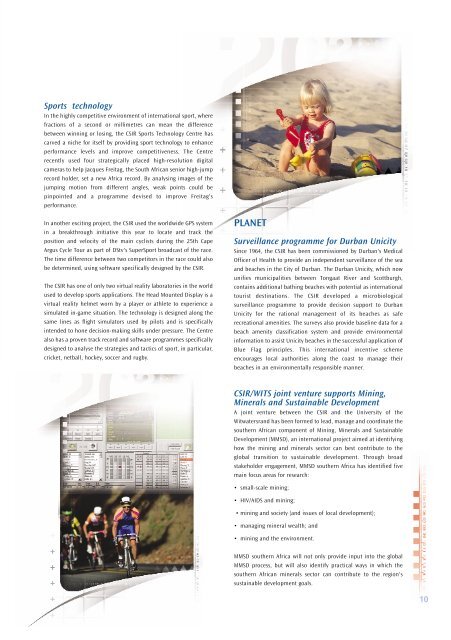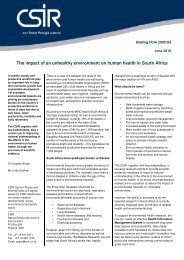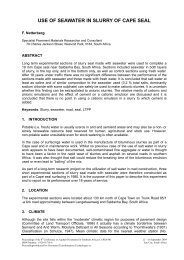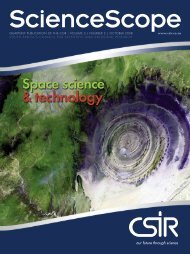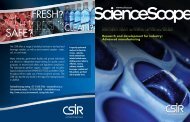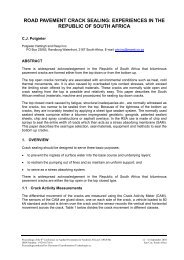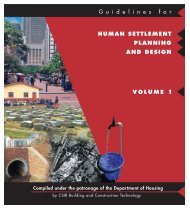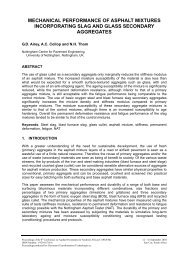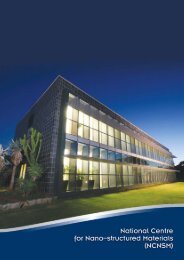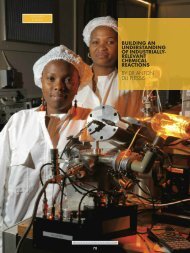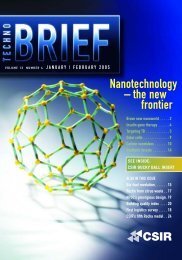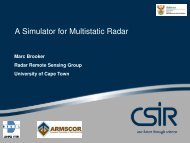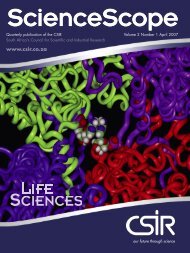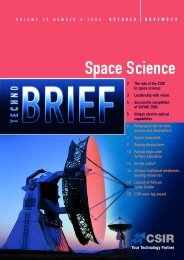CSIR Technology Impact 2002
CSIR Technology Impact 2002
CSIR Technology Impact 2002
Create successful ePaper yourself
Turn your PDF publications into a flip-book with our unique Google optimized e-Paper software.
Sports technology<br />
In the highly competitive environment of international sport, where<br />
fractions of a second or millimetres can mean the difference<br />
between winning or losing, the <strong>CSIR</strong> Sports <strong>Technology</strong> Centre has<br />
carved a niche for itself by providing sport technology to enhance<br />
performance levels and improve competitiveness. The Centre<br />
recently used four strategically placed high-resolution digital<br />
cameras to help Jacques Freitag, the South African senior high-jump<br />
record holder, set a new Africa record. By analysing images of the<br />
jumping motion from different angles, weak points could be<br />
pinpointed and a programme devised to improve Freitag's<br />
performance.<br />
In another exciting project, the <strong>CSIR</strong> used the worldwide GPS system<br />
in a breakthrough initiative this year to locate and track the<br />
position and velocity of the main cyclists during the 25th Cape<br />
Argus Cycle Tour as part of DStv's SuperSport broadcast of the race.<br />
The time difference between two competitors in the race could also<br />
be determined, using software specifically designed by the <strong>CSIR</strong>.<br />
The <strong>CSIR</strong> has one of only two virtual reality laboratories in the world<br />
used to develop sports applications. The Head Mounted Display is a<br />
virtual reality helmet worn by a player or athlete to experience a<br />
simulated in-game situation. The technology is designed along the<br />
same lines as flight simulators used by pilots and is specifically<br />
intended to hone decision-making skills under pressure. The Centre<br />
also has a proven track record and software programmes specifically<br />
designed to analyse the strategies and tactics of sport, in particular,<br />
cricket, netball, hockey, soccer and rugby.<br />
PLANET<br />
Surveillance programme for Durban Unicity<br />
Since 1964, the <strong>CSIR</strong> has been commissioned by Durban's Medical<br />
Officer of Health to provide an independent surveillance of the sea<br />
and beaches in the City of Durban. The Durban Unicity, which now<br />
unifies municipalities between Tongaat River and Scottburgh,<br />
contains additional bathing beaches with potential as international<br />
tourist destinations. The <strong>CSIR</strong> developed a microbiological<br />
surveillance programme to provide decision support to Durban<br />
Unicity for the rational management of its beaches as safe<br />
recreational amenities. The surveys also provide baseline data for a<br />
beach amenity classification system and provide environmental<br />
information to assist Unicity beaches in the successful application of<br />
Blue Flag principles. This international incentive scheme<br />
encourages local authorities along the coast to manage their<br />
beaches in an environmentally responsible manner.<br />
<strong>CSIR</strong>/WITS joint venture supports Mining,<br />
Minerals and Sustainable Development<br />
A joint venture between the <strong>CSIR</strong> and the University of the<br />
Witwatersrand has been formed to lead, manage and coordinate the<br />
southern African component of Mining, Minerals and Sustainable<br />
Development (MMSD), an international project aimed at identifying<br />
how the mining and minerals sector can best contribute to the<br />
global transition to sustainable development. Through broad<br />
stakeholder engagement, MMSD southern Africa has identified five<br />
main focus areas for research:<br />
small-scale mining;<br />
HIV/AIDS and mining;<br />
mining and society (and issues of local development);<br />
managing mineral wealth; and<br />
mining and the environment.<br />
MMSD southern Africa will not only provide input into the global<br />
MMSD process, but will also identify practical ways in which the<br />
southern African minerals sector can contribute to the region's<br />
sustainable development goals.<br />
10


